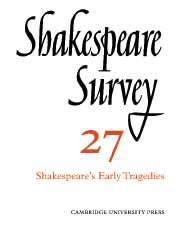Book contents
- Frontmatter
- Shakespeare’s Earliest Tragedies: ‘Titus Andronicus’ and ‘Romeo and Juliet’
- The Aesthetics of Mutilation in ‘Titus Andronicus’
- The Motif of Psychic Division in ‘Richard III’
- The Antic Disposition of Richard II
- The Prince of Denmark and Claudius’s Court
- ‘Hamlet’ and the ‘Moriae Encomium’
- The Relation of Henry V to Tamburlaine
- Shakespeare and the Puritan Dynamic
- Equity, ‘The Merchant of Venice’ and William Lambarde
- ‘Love’s Labour’s Won’ and the Occasion of ‘Much Ado’
- The Date and Production of ‘Timon’ Reconsidered
- Shakespeare, Her Majesty’s Players and Pembroke’s Men
- Judi dench talks to Gareth Lloyd Evans
- Shakespeare Straight and Crooked: A Review of the 1973 Season at Stratford
- The Year's Contributions to Shakespearian Study 1 Critical Studies
- 2 Shakespeare’s Life, Times, and Stage
- 3 Textual Studies
- Index
- Plate section
The Antic Disposition of Richard II
Published online by Cambridge University Press: 28 March 2007
- Frontmatter
- Shakespeare’s Earliest Tragedies: ‘Titus Andronicus’ and ‘Romeo and Juliet’
- The Aesthetics of Mutilation in ‘Titus Andronicus’
- The Motif of Psychic Division in ‘Richard III’
- The Antic Disposition of Richard II
- The Prince of Denmark and Claudius’s Court
- ‘Hamlet’ and the ‘Moriae Encomium’
- The Relation of Henry V to Tamburlaine
- Shakespeare and the Puritan Dynamic
- Equity, ‘The Merchant of Venice’ and William Lambarde
- ‘Love’s Labour’s Won’ and the Occasion of ‘Much Ado’
- The Date and Production of ‘Timon’ Reconsidered
- Shakespeare, Her Majesty’s Players and Pembroke’s Men
- Judi dench talks to Gareth Lloyd Evans
- Shakespeare Straight and Crooked: A Review of the 1973 Season at Stratford
- The Year's Contributions to Shakespearian Study 1 Critical Studies
- 2 Shakespeare’s Life, Times, and Stage
- 3 Textual Studies
- Index
- Plate section
Summary
Many critical studies of Richard II, and a surprising number of productions, start from a curious assumption: that Shakespeare wrote, and asked his leading actor to star in, a long play dominated by a character whose main effect on the audience was to be one of boredom, embarrassment, or at best contemptuous pity. If Richard’s part is not a good one, the play is simply not worth seeing; and ‘good’, in theatrical terms, means not necessarily virtuous but interesting. I want to argue that Richard is in fact rather less virtuous than has often been thought, and, just for that reason, a ‘better’ dramatic character.
Much of our difficulty with the play is a difficulty of knowing what moral connotations to attach to its highly rhetorical language. It is useful to be reminded by R. F. Hill that 'apparently self-conscious control of language does not, of itself, indicate dispassion and triviality in character', especially since he goes on to show that self-conscious language is by no means confined to Richard. Yet there is no doubt that elaborate language is used as a substitute for action and, to that extent, is a symbol of weakness. 'Give losers leave to talk' is an Elizabethan proverb, and in the first two acts of the play the long speeches do in fact belong to the 'losers'-Mowbray, Gaunt, York, the Duchess of Gloucester, and Bolingbroke.
- Type
- Chapter
- Information
- Shakespeare Survey , pp. 33 - 42Publisher: Cambridge University PressPrint publication year: 1974



